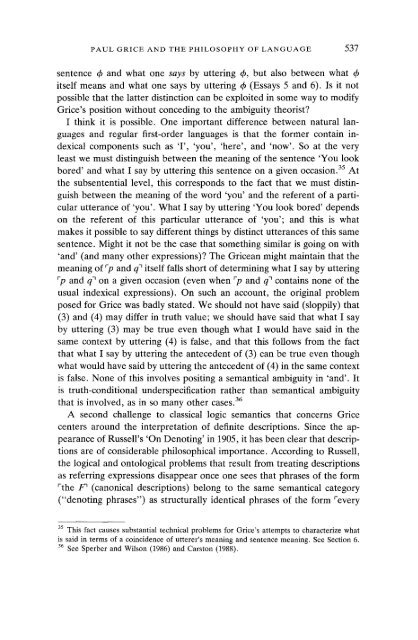Paul Grice and the philosophy of language
Paul Grice and the philosophy of language
Paul Grice and the philosophy of language
You also want an ePaper? Increase the reach of your titles
YUMPU automatically turns print PDFs into web optimized ePapers that Google loves.
PAUL GRICE AND THE PHILOSOPHY OF LANGUAGE 537<br />
sentence q~ <strong>and</strong> what one says by uttering q~, but also between what q5<br />
itself means <strong>and</strong> what one says by uttering ~b (Essays 5 <strong>and</strong> 6). Is it not<br />
possible that <strong>the</strong> latter distinction can be exploited in some way to modify<br />
<strong>Grice</strong>'s position without conceding to <strong>the</strong> ambiguity <strong>the</strong>orist<br />
I think it is possible. One important difference between natural <strong>language</strong>s<br />
<strong>and</strong> regular first-order <strong>language</strong>s is that <strong>the</strong> former contain indexical<br />
components such as T, 'you', 'here', <strong>and</strong> 'now'. So at <strong>the</strong> very<br />
least we must distinguish between <strong>the</strong> meaning <strong>of</strong> <strong>the</strong> sentence 'You look<br />
bored' <strong>and</strong> what I say by uttering this sentence on a given occasion. 35 At<br />
<strong>the</strong> subsentential level, this corresponds to <strong>the</strong> fact that we must distinguish<br />
between <strong>the</strong> meaning <strong>of</strong> <strong>the</strong> word 'you' <strong>and</strong> <strong>the</strong> referent <strong>of</strong> a particular<br />
utterance <strong>of</strong> 'you'. What I say by uttering 'You look bored' depends<br />
on <strong>the</strong> referent <strong>of</strong> this particular utterance <strong>of</strong> 'you'; <strong>and</strong> this is what<br />
makes it possible to say different things by distinct utterances <strong>of</strong> this same<br />
sentence. Might it not be <strong>the</strong> case that something similar is going on with<br />
'<strong>and</strong>' (<strong>and</strong> many o<strong>the</strong>r expressions) The <strong>Grice</strong>an might maintain that <strong>the</strong><br />
meaning <strong>of</strong> rp <strong>and</strong> q7 itself falls short <strong>of</strong> determining what I say by uttering<br />
Fp <strong>and</strong> q7 on a given occasion (even when Fp <strong>and</strong> q" contains none <strong>of</strong> <strong>the</strong><br />
usual indexical expressions). On such an account, <strong>the</strong> original problem<br />
posed for <strong>Grice</strong> was badly stated. We should not have said (sloppily) that<br />
(3) <strong>and</strong> (4) may differ in truth value; we should have said that what I say<br />
by uttering (3) may be true even though what I would have said in <strong>the</strong><br />
same context by uttering (4) is false, <strong>and</strong> that this follows from <strong>the</strong> fact<br />
that what I say by uttering <strong>the</strong> antecedent <strong>of</strong> (3) can be true even though<br />
what would have said by uttering <strong>the</strong> antecedent <strong>of</strong> (4) in <strong>the</strong> same context<br />
is false. None <strong>of</strong> this involves positing a semantical ambiguity in '<strong>and</strong>'. It<br />
is truth-conditional underspecification ra<strong>the</strong>r than semantical ambiguity<br />
that is involved, as in so many o<strong>the</strong>r cases. 36<br />
A second challenge to classical logic semantics that concerns <strong>Grice</strong><br />
centers around <strong>the</strong> interpretation <strong>of</strong> definite descriptions. Since <strong>the</strong> appearance<br />
<strong>of</strong> Russell's 'On Denoting' in 1905, it has been clear that descriptions<br />
are <strong>of</strong> considerable philosophical importance. According to Russell,<br />
<strong>the</strong> logical <strong>and</strong> ontological problems that result from treating descriptions<br />
as referring expressions disappear once one sees that phrases <strong>of</strong> <strong>the</strong> form<br />
~<strong>the</strong> F n (canonical descriptions) belong to <strong>the</strong> same semantical category<br />
("denoting phrases") as structurally identical phrases <strong>of</strong> <strong>the</strong> form revery<br />
3s This fact causes substantial technical problems for <strong>Grice</strong>'s attempts to characterize what<br />
is said in terms <strong>of</strong> a coincidence <strong>of</strong> utterer's meaning <strong>and</strong> sentence meaning. See Section 6.<br />
36 See Sperber <strong>and</strong> Wilson (1986) <strong>and</strong> Carston (1988).














